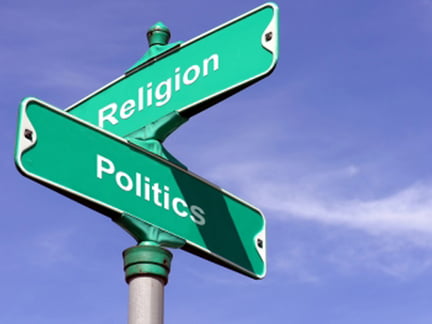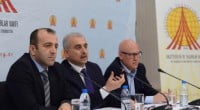Separation politics and Islam makes Gülen AKP’s enemy

Date posted: February 4, 2015
INGE POELEMANS / BRUSSELS
“The Gülen Movement is faith inspired in its motivation, but faith neutral in its manifestation.” That is how key speaker Ozcan Keles, chairperson of Dialogue Society in London, characterized the Gülen Movement in a panel discussion on the Hizmet Movement Tuesday in the European Parliament. Vice-president of the European Parliament, Alexander Graf Lambsdorff, had invited him and scholar Ihsan Yilmaz (Fatih University of Istanbul) to both inform the audience about the Hizmet Movement, both answering their questions in a revealing debate.
Not only Keleş’ statement refers to the fact that the Hizmet Movement is an organization open to all kinds of religions and ideologies, it also means that the Hizmet Movement doesn’t want to propagate Islam. “This idea is completely contrary to the path that the Turkish ruling AKP-party has been walking for the last five years,” Yılmaz says. That path has the same Kemalist aim to distinguish ‘good citizens’ from ‘bad citizens’.
Yılmaz explained that after the collapse of the multi-religious and multi-ethnic Ottoman empire, the main goal of the ruling Kemalists was nation building: they tried to create unity by homogenizing the people through media, education, religion… Their idea of the ‘good’ Turk was the concept of the ‘homo lastus’ : secular, Atatürkist and ethnically Turkish. In opposition of the ‘homo lastus’, there were the Kurds, the Alevi’s, the Armenians but also the practicing Sunni Muslims, who weren’t considered as ‘real Turks’ and didn’t get access to state institutions such as the army and the judiciary system. “These people were either non existent or marked as dangerous for the secular establishment of the state”, Yilmaz stated.
Diversity created by God
Due to the promotion of this ideology, a lot of minority groups suffered, especially religious ones. Out of this frustration, new Islamist movements and political parties arose. Yet their program appeared not to be so different from the project the Kemalists stood for: “Islamists on the surface look religious but if you scratch it off, you also see a modernist state centric idea that serves to homogenize the nation and that divides people in good citizens and bad citizens.” The good citizen was no longer the secular one, but the practicing Muslim. All others were excluded from society.
This unifying homogenizing policy is completely contrary to one of the basic ideas of Civil Islam and the Hizmet Movement, which says that diversity is created by God and thus shouldn’t be opposed, as Keleş explained.
When the AKP showed up as a new party, that neither seemed Kemalist, neither seemed Islamist, the Turkish people were hopeful. The other Turkish left-winged and right-winged parties had collapsed and couldn’t give a straight answer to the economic problems the country was dealing with. Yet at the moment of its establishment, not all of the members of the Hizmet Movement were immediately supportive. But when the AKP as the only Turkish party started to strongly support EU-access and the defense of human rights, they didn’t have a choice. Thus, until 2011-2012 around 80 percent of the people volunteering in the Gülen Movement voted AKP.
Homo Islamitus
This all changed when the AKP started to get ever more convinced of its own power. In 2011 it won its third term election, in which it even increased its votes till 50 percent. A new Islamist policy of the AKP was the result. “This made the actual Turkish president and AKP-leader Recep Tayyip Erdogan create his own project of the ‘ideal citizen’, which was no longer the ‘homo lastus’ but the ‘homo Islamitus’,” Yilmaz said. “Erdogan as well used instruments such as the media, religion and education to propagate his idea of the good Turk. This was against the principles of the Hizmet Movement, which has always argued that you can’t use state force in order to educate people to be better Muslims. »
Another problem was the fact that the Gülen Movement was influential in the media: it possessed the largest newspaper Zaman, and had several press agencies such as Cihan. Erdogan wanted to monopolize the media. Possessing nowadays 70 percent of it, he is almost there. This media struggle increased the tensions between Erdogan and Gülen even more.
Yet Hizmet is not the only victim of Erdogans new policy. Also the Gezi-park protests showed a great disagreement with Erdogans will to impose his life style to the people . “The Gezi-park protesters, the Twitter and YouTube users, the Gülen Movement… They are all victim of kemalist-islamist Erdogan”, Yilmaz stated.
It will not be easy for the Gülen Movement to continue to endure Erdogan’s continuous provocations, Yilmaz said. “I’m afraid the AKP will try to provoke the Hizmet Movement, for example by killing some of their main leaders. This way, it hopes that the Movement will radicalize, so it can call the Gülenists ‘terrorists’. We can do nothing more than asking for justice and for our human rights.”
Source: Today's Zaman , February 04, 2015
Tags: Defamation of Hizmet | Democracy | Hizmet (Gulen) movement | Turkey |
























